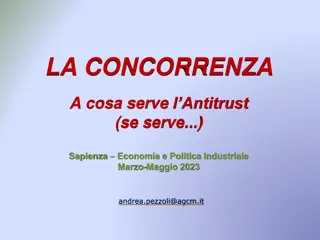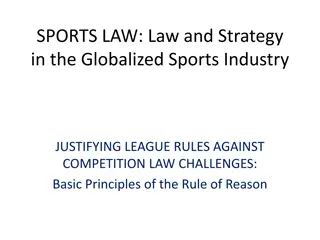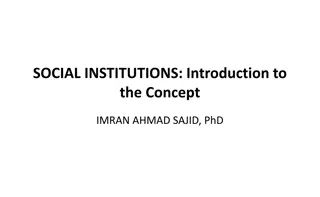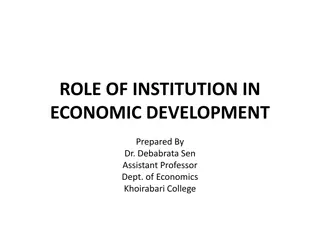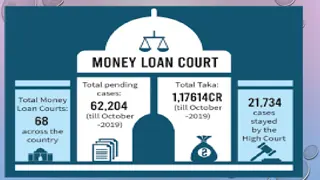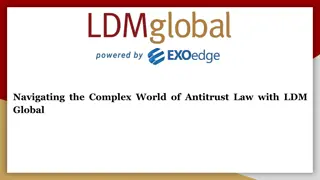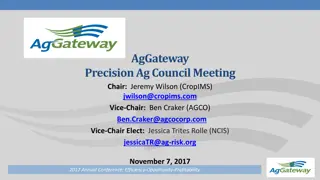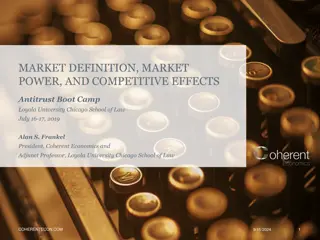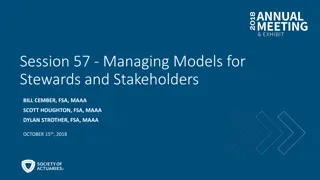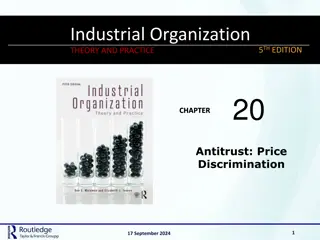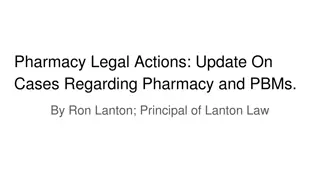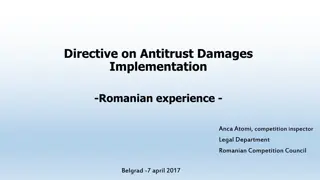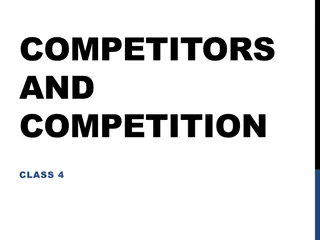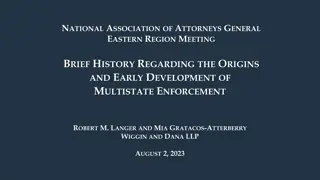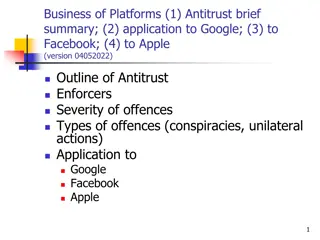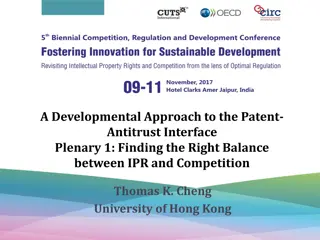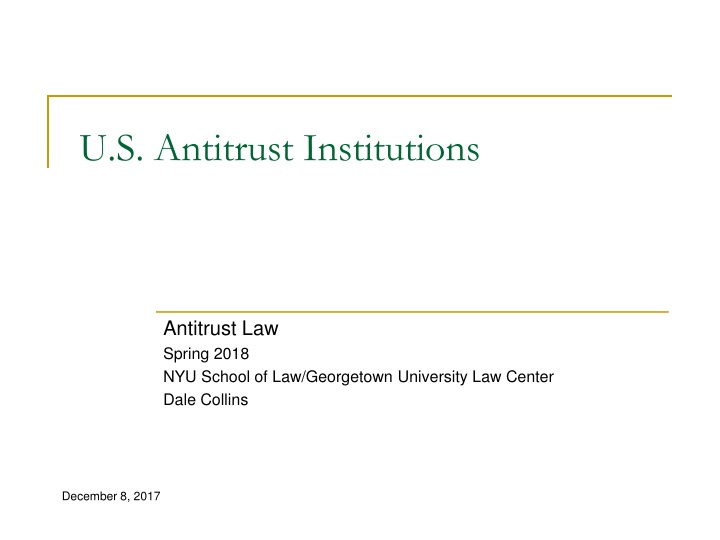
U.S. Antitrust Law and Enforcement
Explore the key aspects of U.S. antitrust law, including the major statutes, enforcement agents, types of sanctions, and legal proceedings. Gain insights into the Department of Justice, Federal Trade Commission, and State Attorneys General roles in enforcing antitrust regulations.
Download Presentation

Please find below an Image/Link to download the presentation.
The content on the website is provided AS IS for your information and personal use only. It may not be sold, licensed, or shared on other websites without obtaining consent from the author. If you encounter any issues during the download, it is possible that the publisher has removed the file from their server.
You are allowed to download the files provided on this website for personal or commercial use, subject to the condition that they are used lawfully. All files are the property of their respective owners.
The content on the website is provided AS IS for your information and personal use only. It may not be sold, licensed, or shared on other websites without obtaining consent from the author.
E N D
Presentation Transcript
U.S. Antitrust Institutions Antitrust Law Spring 2018 NYU School of Law/Georgetown University Law Center Dale Collins December 8, 2017
Overview Four antitrust statutes Five types of enforcement agents Four types of sanctions/relief Four types of proceedings AppliedAntitrust.com AppliedAntitrust.com Antitrust Law Spring 2018 NYU School of Law/Georgetown University Law Center Dale Collins 2
Four Antitrust Statutes The major provisions that define offenses Sherman Act Section 1 prohibits contracts, combinations . . . and conspiracies in restraint of trade Section 2 prohibits monopolization, attempted monopolization, and conspiracies to monopolize Clayton Act Section 7 prohibits the acquisition of stock or assets whose effect may be substantially to lessen competition, or to tend to create a monopoly Robinson-Patman Act Section 2 prohibits certain discriminations in price Federal Trade Commission Act Section 5 prohibits unfair methods of competition NB: Unlike other provisions, not included in the definition of antitrust law in Clayton Act 1 This will be important when it comes to private actions AppliedAntitrust.com AppliedAntitrust.com Antitrust Law Spring 2018 NYU School of Law/Georgetown University Law Center Dale Collins 3
Five Types of Enforcement Agents Department of Justice (DOJ) Antitrust Division Federal Trade Commission (FTC) State Attorneys General Injunctive relief actions Parens patriae actions Class actions for damages sustained by citizens of the state brought by the state attorney general Individual private parties Private class actions AppliedAntitrust.com AppliedAntitrust.com Antitrust Law Spring 2018 NYU School of Law/Georgetown University Law Center Dale Collins 4
Four Types of Sanctions/Relief Criminal fines/imprisonment Damages (usually trebled) Injunctive relief Other equitable relief Most notably disgorgement AppliedAntitrust.com AppliedAntitrust.com Antitrust Law Spring 2018 NYU School of Law/Georgetown University Law Center Dale Collins 5
Four Types of Proceedings Criminal prosecutions in federal district court Civil judicial adjudications in federal district court FTC administrative adjudications Agency administrative resolutions (consent decrees) AppliedAntitrust.com AppliedAntitrust.com Antitrust Law Spring 2018 NYU School of Law/Georgetown University Law Center Dale Collins 6
Summary Injunctive Relief Forum Criminal Damages X DOJ X Federal court (under federal law) Administrative court FTC X X Federal court for federal and state claims X State AGs* X (on behalf of citizens) (under state law) Federal court for federal and state claims Private* X X * Can bring state antitrust claims (but not federal antitrust claims) in state court AppliedAntitrust.com AppliedAntitrust.com Antitrust Law Spring 2018 NYU School of Law/Georgetown University Law Center Dale Collins 7
Government Organization United States Department of Justice AppliedAntitrust.com AppliedAntitrust.com Antitrust Law Spring 2018 NYU School of Law/Georgetown University Law Center Dale Collins 8
Government Organization Antitrust Division Notes: 1. The ATD has a hierarchical structure. 2. The Assistant Attorney General (AAG) has complaint authority to file a complaint without seeking the approval of anyone else. No one else in the Division has complaint authority. As a result, the AAG is the ultimate and sole decision-maker on legal challenges brought by the ATD. 3. The AAG is nominated by the President and subject to confirmation by the Senate. No one else in the ATD is subject to Senate confirmation. 4. The AAG serves at the pleasure of the President and the Attorney General and may be removed with cause. AppliedAntitrust.com AppliedAntitrust.com Antitrust Law Spring 2018 NYU School of Law/Georgetown University Law Center Dale Collins 9
Government Organization Notes: 1. The FTC has a collegial structure, that is, the Commission cannot take enforcement action unless a majority of the Commissioners vote to do so. No single person can make an enforcement decision for the FTC. 2. The FTC Act provides for five Commissioners. Each Commissioner serves for a term of seven years (or fills out the remaining term of her predecessor). By law, no more than three Commissioners can be a member of the same political party. 3. Each Commissioner is nominated by the President and subject to confirmation by the Senate. No one else in the FTC is subject to Senate confirmation. 4. The President appoints the chairman of the Commission, who is responsible for chairing Commission meetings and for administering the staff of the FTC. 5. The FTC is an independent agency, so that Commissioners do not serve at the pleasure of the President and can only be removed for cause. Federal Trade Commission Commissioners Bureaus involved in antitrust investigations AppliedAntitrust.com AppliedAntitrust.com Antitrust Law Spring 2018 NYU School of Law/Georgetown University Law Center Dale Collins 10
Government Organization FTC Bureau of Competition Notes: 1. The Bureau of Competition (BC) is the competition legal arm of the FTC and conducts antitrust investigations and legal challenges. 2. BC has a hierarchical structure. 3. The Director of the Bureau of Competition is appointed by the Commission and is the Commission s chief antitrust enforcement staff official. 4. The BC Director makes recommendations to the Commission on enforcement actions. As a matter of practice, the recommendations of other BC officials also go to the Commission. AppliedAntitrust.com AppliedAntitrust.com Antitrust Law Spring 2018 NYU School of Law/Georgetown University Law Center Dale Collins 11
Government Organization FTC Bureau of Economics Notes: 1. The Bureau of Economics (BE) the economics arm of the FTC and participates in investigations conducted by BC. 2. BE has a hierarchical structure. 3. The Director of the Bureau of Economics is appointed by the Commission and is the Commission s chief economics staff official. 4. The BE Director makes recommendations to the Commission on antitrust enforcement actions. As a matter of practice, the recommendations of other BE officials also go to the Commission. Involved in antitrust investigations AppliedAntitrust.com AppliedAntitrust.com Antitrust Law Spring 2018 NYU School of Law/Georgetown University Law Center Dale Collins 12

